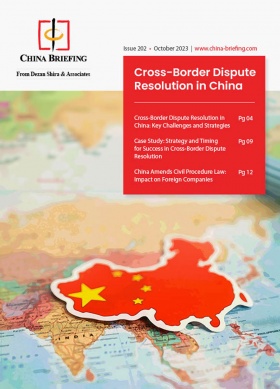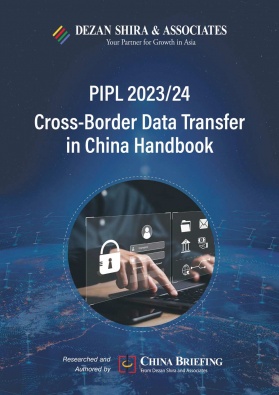Cross-Border Dispute Resolution in China: Key Challenges and Strategies
The effective management of cross-border dispute resolution is important. Yet, China presents unique challenges, such as disparities in legal systems, cultural nuances, language barriers, and limited resources within a rapidly evolving jurisdiction. Understanding the core aspects of the dispute resolution process in China and implementing suitable strategies is imperative.
China has been a magnet for foreign investment over the past 30 years due to its remarkable growth prospects, expansive domestic market, and the presence of a well-established supply chain and infrastructure. However, despite several predominantly successful investment narratives, there have also been adverse outcomes.
Foreign investors may find themselves embroiled in disputes with suppliers, consumers, and business partners over various matters, or contend with administrative investigations and penalties imposed by government authorities. We generally categorize such disputes, which emerge between foreign and domestic entities concerning their business activities, assets in China, or transactions linked to China, as cross-border disputes.
In recent years, cross-border disputes have become more common. According to official statistics from China’s Supreme Court, the number of first-instance foreign-related civil and commercial cases handled by courts nationwide surged from 14,800 in 2013 to 27,300 in 2021, marking an 84 percent increase over eight years. While it’s worth noting that foreign-related civil and commercial cases have a broader scope than cross-border disputes, the data still offers insights into these trends. Further, due to the pandemic, the non-fulfillment of numerous contracts has contributed to an uptick in the number of cross-border disputes.
In light of this, effective management of cross-border dispute resolution in China holds immense significance. It not only impacts businesses’ economic interests but also exerts influence over their operational control, reputation among business partners, and, in certain instances, public relations.
This article is intended to introduce the common types of cross-border disputes in China, explain the challenges for foreign investors, and provide practical tips for navigating cross-border dispute resolution within the Chinese context.
Common types of cross-border disputes in China
Disputes between suppliers and buyers
During the execution of procurement contracts, various disputes can arise between suppliers and buyers. These disputes typically revolve around the following aspects of the procurement contract:
- Disputes related to late
- Disputes arising from the supplier’s failure to meet delivery
- Disputes stemming from deficiencies in material or product
- Disputes involving breaches of confidentiality
- Disputes resulting from losses incurred due to force majeure events, which are unforeseeable circumstances that prevent the fulfillment of a contract, such as natural disasters, government actions, or social
There has been a marked increase in disputes linked to supplier delays, disputes arising from force majeure-induced losses, and disputes over delayed payments in the past three years. These escalations are attributed to disruptions in the supply chain caused by COVID-19 pandemic prevention and control measures, as well as the challenges faced by businesses in general.
Dispute with JV partners
Generally, foreign investors have been cautious in choosing the joint venture (JV) as their market-entry approach due to the anticipated complexities in management, differences in cultural and business approaches between partners, and the high risk of technology leakage.
However, since the onset of the COVID-19 pandemic, a shift has emerged in China’s foreign direct investment (FDI) landscape: an increasing number of foreign investors are expressing interest in adopting the JV structure to penetrate the Chinese market, deviating from past practices. For foreign stakeholders, opting for a JV presents an avenue to reduce upfront investment, share costs, and mitigate risks by collaborating with a local partner well-versed in the Chinese market, culture, knowledge, policies, and practices. These advantages are attractive in today’s volatile, uncertain, complex, and ambiguous (VUCA) global landscape.
That said, it is not rare to see disputes arise between JV partners over equity distribution, control, business plans, and other issues like deadlock scenarios, exit strategies, and termination mechanisms.
Disputes with other business partners
In practice, cross-border disputes can also occur between foreign investors and other business partners, including local economic development bureaus, chambers of commerce, industrial parks, and the like.
Throughout the investment journey, foreign investors may have initiated projects based on a framework agreement with these business partners. These framework agreements might be informal or contain only general provisions, and disagreements can subsequently emerge concerning matters like preferential treatment, investment amounts, progress, and more.
Other types of cross-border disputes
Beyond the aforementioned categories of cross-border disputes, foreign businesses can also find themselves embroiled in disputes involving administrative investigations and penalties, as well as disputes arising during the disposal of assets in China.
When investing in China or collaborating with Chinese partners, foreign businesses may be subjected to various forms of administrative investigations by government agencies. These investigations may encompass tax compliance assessments conducted by the tax bureau, inquiries into consumer complaints or advertising compliance issues by market regulation authorities, and environmental compliance assessments carried out by local environmental protection agencies.
During these investigations, foreign businesses are required to actively cooperate with the relevant bureaus and provide the necessary documentation. In cases where foreign businesses disagree with the investigation results or the imposed penalties, they must seek recourse through legitimate channels as stipulated in relevant laws and regulations.
Disputes arising during the disposal of China assets can happen between the foreign real estate owner and the buyer, the agent handling the transaction, or even third parties seeking to obstruct the asset’s disposal.
Why foreign investors find it hard to solve disputes in China
Complexity of China’s legal system
China’s legal system, while sharing some similarities with those of Germany and France, possesses its distinct characteristics. It is also distinct from the common law system adopted by the United States and the United Kingdom.
Additionally, despite having well-established laws and regulations at the national level, local variations are prevalent. Furthermore, China’s legal landscape is in a state of constant flux to keep pace with its rapidly evolving economy and society. All these factors combine to create substantial hurdles for foreign investors seeking to comprehend China’s legal system.
A diverse range of disputes
As discussed in the preceding section, foreign investors can become entangled in a wide array of disputes covering diverse issues. Effective resolution for each of these dispute types demands varying knowledge and expertise. The timing and strategy for addressing different types of disputes may also differ, necessitating a case-specific analysis. Consequently, it becomes nearly unfeasible for an internal legal team within foreign investors’ organizations to formulate efficient dispute resolution strategies for every conceivable type of dispute in China.
Unique dispute resolution practices
Dispute resolution practices in China can vary from what foreign investors are accustomed to. For example, mediation is emerging as an alternative dispute resolution method favored by Chinese officials, who view its non-confrontational and consultative approach as more effective in preserving positive relationships while settling disputes. In China, mediation is not limited to a pre-arbitration or pre-litigation phase; the court may actively encourage parties to mediate at various stages throughout the litigation process.
On the other hand, for disputes that proceed to litigation, foreign parties often encounter significant challenges and uncertainties related to language, the availability of evidence, the service of court documents, and more.
Enforcement challenges
Enforcing legally binding judicial judgments and arbitration awards has historically been a challenging endeavor in China. As of November 2021, only 35.09 percent of completed cases had been successfully enforced. This situation is attributable to a variety of factors, and China has made efforts to enhance its business environment and increase the enforcement rate. However, at present, foreign investors involved in disputes should not assume that winning a case automatically guarantees successful enforcement. Instead, the careful formulation of strategies and the implementation of precautionary measures are of paramount importance.
Other factors
In addition to the factors mentioned above, foreign investors may encounter challenges in dispute resolution in China due to limited resources, which impede their ability to comprehend and anticipate the potential actions the opposing party might take. This often places them at a disadvantage when devising effective dispute-resolution strategies.
Moreover, effective dispute resolution in China, in the best interest of all parties involved, demands more than just a grasp of China’s legal system. It necessitates a comprehensive understanding of various aspects, including foreign investors’ operations, tax implications, human resources, and other relevant considerations. Given that most foreign businesses and investors typically lack a robust legal team in China until they reach a certain scale, they often lack a key figure, such as the head of a legal team, who can coordinate efforts among various departments for optimal dispute resolution.
Practical strategies for optimized dispute resolution in China
Paying enough attention to the dispute resolution clause in all contracts
Given the potential complexities associated with dispute resolution in China, it is imperative to incorporate well-considered dispute resolution clauses into all investment and business contracts. These clauses play a pivotal role as the initial step toward achieving optimized dispute resolution.
Different provisions within these clauses directly impact the overall cost, efficiency, and effective enforcement of judicial outcomes in future dispute resolution proceedings.
It’s worth noting that in the context of cross-border disputes, there is no one-size-fits-all formula for drafting dispute resolution clauses. For example, opting for arbitration as the dispute resolution method or selecting the law of the foreign party’s home country as the governing law may not always be in their best interest. A proper dispute resolution clause should encompass a thorough evaluation of the agreement’s validity, the procedure for enforcing judicial documents, the applicability of interim measures, the cost of dispute resolution, as well as the likelihood of default by each party, among other factors.
Seeking assistance from qualified and suitable legal professionals
In addition to implementing precautionary measures for dispute resolution, to achieve optimal results, foreign investors are strongly advised to seek assistance from qualified legal professionals at the earliest opportunity.
Early involvement of legal experts can provide foreign investors with a distinct advantage in analyzing and predicting potential dispute developments, enabling the formulation of effective dispute resolution strategies. It is essential to recognize that for disputes subjected to litigation in China, foreign parties can only be represented by Chinese counsel. Over the years, China has cultivated a sophisticated and multi-tiered legal market with professionals who have received their education both domestically and abroad. This market encompasses not only the renowned “Red Circle” firms, akin to the prominent law firms in the United States or the Magic Circle firms in the United Kingdom, but also boutique law firms known for their expertise in specific fields.
Nevertheless, finding suitable lawyers for specific cases can be a challenging task. Disputes can have distinct characteristics, and it’s challenging for legal professionals to amass expertise in every area. Additionally, aside from well-known rankings that showcase a handful of top lawyers, determining the real expertise of a specific lawyer through desktop research is hard. In such a scenario, foreign investors are wise to collaborate with their China compliance service provider who possess a comprehensive understanding of their businesses and the local legal market. These compliance service providers can assist in the screening and selection of law firms and lawyers, facilitating the choice of the most suitable legal professionals for the specific case at hand.
Taking a comprehensive approach to disputes and crafting optimal resolution strategies
Drawing from our experience, when faced with cross-border disputes or potential disputes, foreign parties should view the current issue within a broader context rather than looking at it as a standalone event. This involves conducting thorough background checks and considering various aspects and processes comprehensively, rather than treating it as an isolated incident. For instance, in the context of a procurement contract, when a customer fails to make timely payments and repeatedly refuses to pay, it may raise suspicions of underlying business difficulties and a heightened risk of default. If these suspicions align with other indicators, such as credit records or tax penalty announcements, the foreign party, acting as one of several suppliers, should swiftly engage the dispute resolution mechanism while considering enforceability right from the outset. This proactive approach ensures the protection of their interests.
For those foreign investors who lack an extensive legal team dedicated to their China-based endeavors, utilizing third-party dispute resolution support services is a viable option. These services can assist in coordinating various stages of the dispute resolution process, offering timely support as well as legal expertise. This approach ensures that foreign investors are well-equipped to manage cross-border disputes effectively and protect their business interests in the complex and evolving Chinese business landscape.
(This article was originally included in the China Briefing Magazine issue Cross-Border Dispute Resolution in China.)
About Us
China Briefing is one of five regional Asia Briefing publications, supported by Dezan Shira & Associates. For a complimentary subscription to China Briefing’s content products, please click here.
Dezan Shira & Associates assists foreign investors into China and has done so since 1992 through offices in Beijing, Tianjin, Dalian, Qingdao, Shanghai, Hangzhou, Ningbo, Suzhou, Guangzhou, Haikou, Zhongshan, Shenzhen, and Hong Kong. We also have offices in Vietnam, Indonesia, Singapore, United States, Germany, Italy, India, and Dubai (UAE) and partner firms assisting foreign investors in The Philippines, Malaysia, Thailand, Bangladesh, and Australia. For assistance in China, please contact the firm at china@dezshira.com or visit our website at www.dezshira.com.
- Previous Article Hong Kong Launches a New Capital Investment Entrant Scheme
- Next Article China-Netherlands Relations: Bilateral Trade and Investments Overview


























